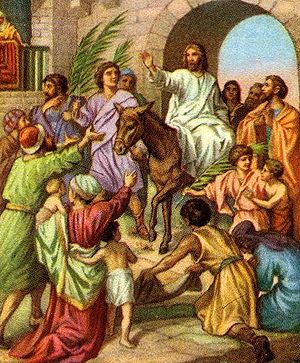Day 40, Saturday, April 7, 2012

Today is the 40th and last Day of Lent and I’m so happy for this journey into the wilderness with Jesus that we have been through. It’s for the first time that I did a Lent devotional and I liked it. If I have the time, I would love to do it again next year. For those of you who have been with me on this journey in the past forty days (and I know there aren’t many) either on our church’s Facebook page or on my blog, I really appreciate your time. I hope you have been blessed in some way. If so, I would love to get your feedback.
Today is called holy or silent Saturday, a day of preparation for celebrating the resurrection. Our Lord has been laid in the grave after He cried out with a loud voice on the cross, as He breathed His last: “Father into your hands I commit my spirit” (Luke 23:46). We need not mourn for the death of our Lord Jesus Christ because that was not the end of His life. In fact, it was the beginning of a new era that would inaugurated with His resurrections—an era of victory over sin, death and Satan. Jesus is victorious. The cross could not end His mission. In fact, the death on the cross was His earthly mission on which He was sent by His God the Father. In all the days of His wilderness experience and during His last week of passion in Jerusalem, Jesus was slowly moving to the cross. He knew the cross will be so painful, but He also trusted God who would raise Him up. The irrefutable fact of His resurrection made His timid disciples so bold that they could not hide themselves in the upper rooms. They went out into the streets, bazaars, and even to the Jerusalem Temple in a dangerous city. The disciples proclaimed this fact of God raising Jesus from the dead with all boldness even to the Jewish authorities,
“If we are being called to account today for an act of kindness shown to a man who was lame and are being asked how he was healed, then know this, you and all the people of Israel: It is by the name of Jesus Christ of Nazareth, whom you crucified but whom God raised from the dead, that this man stands before you healed. Jesus is
“‘the stone you builders rejected,
which has become the cornerstone.’
Salvation is found in no one else, for there is no other name under heaven given to mankind by which we must be saved” (Acts 4:9-12 NIV).
Friends, we need to pray and ask for the same kind of passion and boldness now to proclaim the good news of Jesus, His resurrection, and His coming again. The world needs it badly today more than ever and we are privileged to have the good news. Let’s keep sharing it with others until He comes again.
Have a blessed Easter. The Lord is risen! He’s risen indeed!
Related articles
- Dieing to live (pastorayres.wordpress.com)
- Christ has risen! The significance of the Resurrection (rodiagnusdei.wordpress.com)
- The power of Resurrection (thebereanway.wordpress.com)
- The Resurrection: The Greatest Miracle (acatholicdad.wordpress.com)




